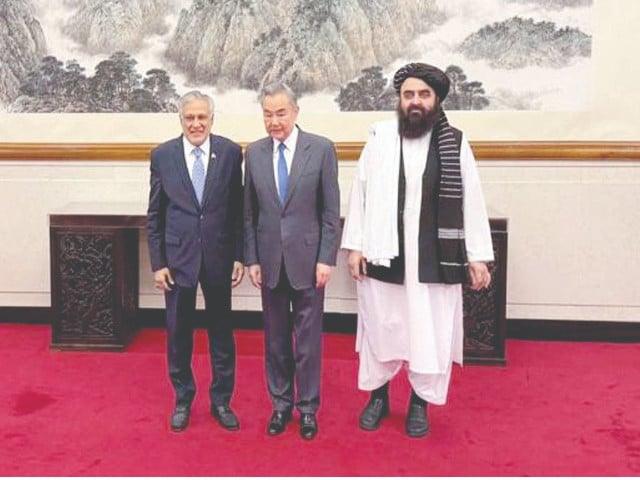Islamabad:
Pakistan and Afghanistan decided to improve their diplomatic ties and, in principle, they agreed to exchange full -time ambassadors, Beijing announced Wednesday, in a great advance in the bilateral relationship that remained tense since the Taliban took over Kabul almost four years ago.
Historical development was announced by the Chinese Ministry of Foreign Affairs in a statement issued after Foreign Minister Wang Yi organized a trilateral meeting with Pakistani and Afghan Foreign Ministers in Beijing.
“Afghanistan and Pakistan expressed a clear willingness to raise diplomatic relations and agreed in principle to exchange ambassadors as soon as possible,” Wang said in a statement at the end of an informal meeting with the Minister of Foreign Affairs, Ishaq Dar and the Minister of Foreign Affairs, Amir Khan Muttaqi.
“China welcomed this and will continue to provide assistance to improve Afghanistan-Pakistan relations,” added the main Chinese diplomat.
Pakistan and Afghanistan have maintained the diplomatic presence in the capital of the other, but the missions were headed for matters accused and not by full -time ambassadors.
Exchangeing ambassadors means that Pakistan would come to recognize the Taliban government. China was the first country that sent a full -time ambassador to Kabul and accepted the envoy Taliban in March this year.
A Pakistani senior official said that the discussions in Beijing were positive and all parties agreed to work closely to achieve common goals.
A separate statement issued by the Ministry of Foreign Affairs did not mention the update in diplomatic ties with Afghanistan.
Unlike the past, Pakistan this time decided to go along with the international community on the issue of recognition. Initially, when the Taliban took over, Pakistan advocated the commitment to the new regime and persuaded countries to recognize the government as soon as possible.
However, Pakistan’s own ties with the Taliban government deteriorated within a few months of the change of government in Kabul, forcing Islamabad to change their position. Pakistan then decided to link the recognition of the Taliban government with Kabul acting decisively against terrorist groups, including the forbidden Tehreek-E-Taliban Pakistan (TTP).
It is believed that China was pushing on both sides from behind the scene to solve their problems through dialogue. The sources said that for the first time the Taliban government had demonstrated not only the will, but began certain steps to stop the groups that operate from their territory.
The issue of terrorism was one of the key conversation points during three -way conversations in Beijing. The Chinese official read that Wang emphasized the need to combat terrorism in all its forms and manifestations. He also asked for joint cooperation to combat the threat of terrorism.
At the same time, Chinese Foreign Minister warned both parties to remain attentive to external interference in internal affairs of regional countries. Although no country was mentioned by name, the reference to external interference seems to suggest India.
Following the recent climbing in tensions in a military conflict between India and Pakistan, New Delhi was trying to reach the Taliban government. By breaking with his decades, the Minister of External Affairs of India, S Jaishankar, spoke with the Minister of Foreign Affairs of the Afghan.
The measure seems to be part of India’s recalibration to press Pakistan. But the Beijing meeting seems to have planned that movement. The declaration of the China Ministry of Foreign Affairs suggested that there was a great incentive for the Taliban government to work closely with Beijing and Islamabad.
The statement indicated that Beijing and Islamabad were ready to expand the “Economic Corridor of China-Pakistan (CPEC) to Afghanistan to strengthen and build regional connectivity networks.
Meanwhile, the Declaration of the Ministry of Foreign Affairs said that the three foreign ministers had a broad and constructive dialogue to deepen cooperation through better communication and mutual trust. They reaffirmed the importance of the trilateral platform to support regional peace, the development and progress of their strategic vision for regional connectivity.
Welcoming the recent improvements in the security environment of Afghanistan, they recognized solid economic ties and connectivity as essential requirements for regional growth and prosperity. They also highlighted the importance of continuous diplomatic participation and practical cooperation under the trilateral framework.
The Deputy Prime Minister and Foreign Minister reaffirmed Pakistan’s commitment to promote nearby and cooperative ties with Afghanistan, especially in commerce, transit, health and connectivity.
China and Pakistan reiterated their support to extend the CPEC to Afghanistan under the widest framework of the cooperation of the Belt and Road (BRI) initiative. China expressed its support for Pakistan and Afghanistan to safeguard their territorial integrity, sovereignty and national dignity.
Recognizing the importance of eradicating terrorism and external threats in the region, as necessary to achieve economic and connectivity objectives, all parties agreed to improve security cooperation to promote peace and stability.
They reiterated their position against terrorism in all its forms and manifestations. It was agreed that the sixth meeting of trilateral foreign ministers would be held in Kabul at an early and mutually convenient date.




